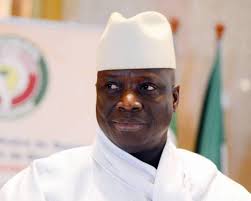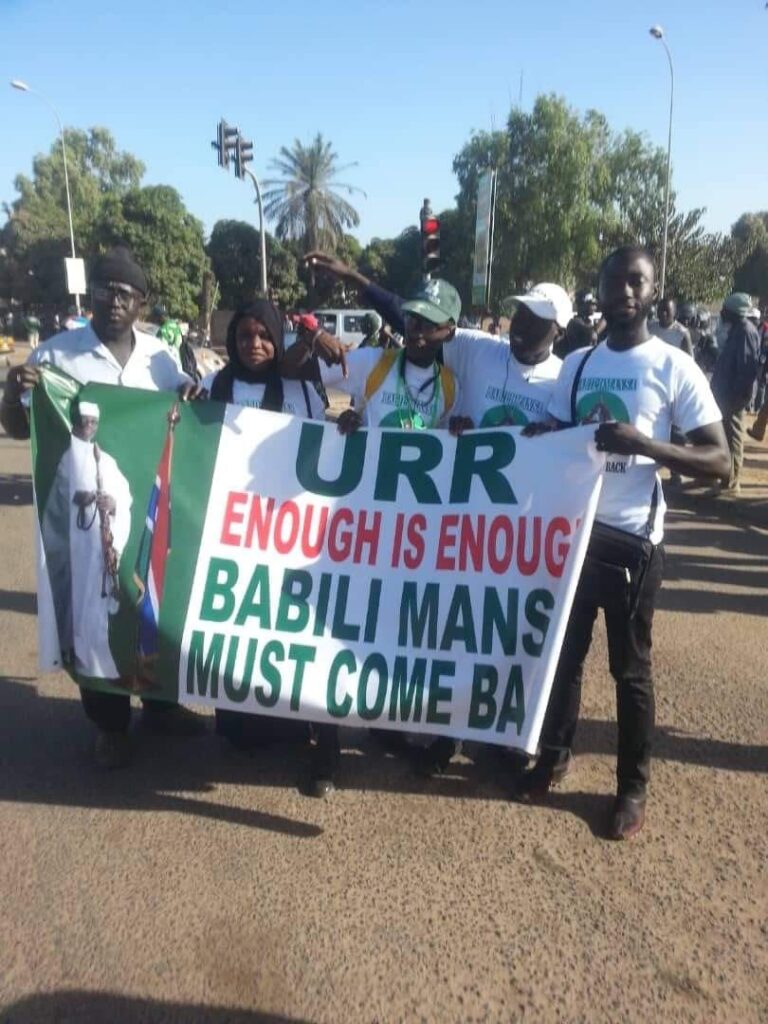
Every Gambian or group of people in the Gambia are entitled, as a matter of right, to offer political support to the government or whomever you choose. But you also have a higher duty, especially as genuine pro-democracy and human rights activists with constitutional law public policy background, to offer honest public policy and legal opinions on essential matters of grave public interest and good governance.
After all, professional ethics require activist with causes to avoid being recruited into the partisan cause(s) and to be forthright in their activism. Even in situations where forthrightness means losing out on godfatherism politics or briefs and state patronage.
The general rule regarding opinion evidence is that an intellectual or someone claimed to be knowledgeable is not allowed to proffer an opinion on a matter that requires expertise unless he is specially-skilled (or an expert) on such issues and that a referent witness is not allowed to express an opinion on any other matter if the underlying facts can be stated in an intelligible manner without reference to the idea.
Further, expert advice is confined to objective and quantifiable professional views based on the expert’s line of specialisation. It does not descend into the arena of a contested matter, as this is a matter for the protagonists.
Our tragedy is the racket in the public domain of worthless opinions urged by respectable voices who are in truth nothing more than prostitutes calling the lies of their current clients as truth. That civic noise of intellectual vandals drowns out the few, authentic voices of reason and pushes nations towards the precipice of destruction.
Abolishing a political party is like destroying freedom of association and a deceptive way of killing democracy. Any legislation which is said to enshrine rights limits freedom of association and expression be regarded as hostile or hateful. Any law that bans a political party mostly falls into a bundle of legislation that requires to be updated to keep pace with modernity. The Constitution prohibits all forms of discrimination.
In societies that value free speech and association, it is not enough to prove even the worst motivation; a party must also have a “real potential” to make use of evil designs. With the standard of proof for banning political parties, mandated by the European Court of Human Rights in Strasbourg, is high.

The Alliance for Reorientation and Construction Party (APRC) is truly nasty, but not strong enough to be able to fulfill its goals and too peripheral to matter to ban. The idea of banning people who have a common interest from co-operating is a complete misunderstanding of society throughout history.
Humans are social animals. Politics is as human as violence. What humans know is that they are stronger in a team than on their own. That it is easier to win a fight as a gang than an individual. Society is based on this.
Political parties allow proper arguments about any issue. There are as many ideas on politics as there are people. What parties do is distill that into several choices. They make it possible for democracy to happen, decisions to be made and for the country to be governed.
Banning people from co-operating is like Knut banning the tide from coming in. Every now and then you wink and patted back and whispered encouragement or tacit understanding that someone will back you up, stand on your side and that you will reciprocate is a political party.
Anyone who has unconventional views, cannot expect any hearing, let alone a fair one. It may be the only way of keeping order in a crowded multicultural society, but it has taken much of the joy out of life.
Every day, thousands of thinkers, reporters, writers, scholars, mentors, take to the media to sell their ethnic interests as national, to argue the virtues of some politicians over the other. In suing for sympathy for their candidates, the most honest argument they can genuinely make is often ‘My thief is better than yours,’ but no: for self-interest, common thieves are dressed up as statesmen and presented as messiahs to deluded nations that see blood plainly and drink it as milk.
A clear case of those who are willing to be lost falling into the hands of those willing to sell them out, which is why the pimping of intellect is the public intellectual’s high crime.
Democracy tricks us into embracing every new dawn as a new era. The modern era soon gets us scarred. We howl in horror and utter disappointment recoil and rummage for new saviours. We start again, cruising across oceans, fighting tides, and tempests, in search of a cozy home we may never find. We embrace every new mouth with new songs forgetting that all change happens only in the name and in sound bites.
Germane to this write-up and to paraphrase Ben Okri, “The Blind Men and the Elephant,” I empathise with Ben Okri’s sentiments – specific to the Gambia as well a parable, empathy for the Gambia “to poison a nation, poison its stories. A demoralised nation tells demoralised stories. Anything that affects our perception of the world sometimes comes in the form of a story. Be aware of the stories that we imbibe”.
And the folly of some Gambians who support the dismantling of the rule of law and the establishment of a dictatorship under the erroneous assumption that the effects will only be felt by members of other ethnic groups and their political rivals. The Gambia has travelled this path before, with disastrous and harrowing consequences. Indeed, countless examples may be given of this perennial and perhaps congenital folly. To illustrate:

The Gambia and Gambian politicians cheered and acquiesced in the establishment of an imperial presidency and destruction of constitutional checks and balances between 1994 and 1997. The result of this folly included the erosion of the rule of law, forced disappearances, torture, murders, assassinations, detentions without trial, close of media houses and forced exiles, etc.;
Gambian major opposition politicians voluntarily crossed from the People’s Progressive (PPP) Party, National Convention Party (NCP), Gambian People’s Party( GPP) to the Alliance for Patriotic Reorientation and Construction( APRC) and the United Democratic Party(UDP) just to benefit from state patronage, making the Gambia a de facto single-party state.
They quickly and painfully learned their folly with the ban and prohibition of the major political parties or thereabouts under Military Decree no. 89, issued on August 14 reiterated the ban on the PPP, the NCP, and the GPP.
Gambians and Gambian politicians who cheered the establishment of a de jure a semblance of a single-party state soon realised the folly of the move when they were banned from political association. The notoriously restrictive Decree, No. 89 of 1994, promulgated and prevented parties like the Peoples Progressive Party, which had ruled the country since independence from Britain in 1965, from participating in elections.
The decree that had been in force was “draconian, despotic and obnoxious,” adding that a country that believes in the rule of law and human rights “has no business to enslave its citizens” by discriminating against them on political grounds. Local banned politicians who had become increasingly restive had begun re-grouping and re-organising themselves formed the United Democratic Party (UDP).
Some of the banned opposition politicians, the PPP, NCP, and GDP were on the receiving end of the APRC Government’s despotic acts occupied high profile positions in the APRC as well the Grand Coalition of opposition that formed the United Democratic Party (UDP). They abandoned a commitment to the ideals of constitutionalism and the rule of law immediately they rose to high office, on the erroneous assumption that they would remain in such high offices forever.
When you imagine the death of the rule of law, you usually envision some dramatic scenario, such as the edict of a military dictatorship, which has usurped power by force. Yet the same end can also be pursued through more mundane actions, like criminal prosecutions, banning political parties, targeting political opponents or members of the civil society groups including journalists and dissenters. This can be through a process of eroding constitutional norms such as extrajudicial and undemocratic means in the name of the rule of law (criminal accountability) itself.
It is time for everyone who shares a richer conception of pluralist democracy envisioned in the 1997 Constitution as well in the draft constitution, in which the legitimate power of elected governments or opposition political parties is subject to checks and balances, to stand up for judicial independence.
Otherwise, we may one day wake up to realise that this crucial bulwark of liberal democracy has been lost.
The National Assembly is deeply conservative. Members of the National Assembly rarely debate or pass legislation on emotive subjects. Political parties have the rights to define the contemporary human rights debate.
Globally, the law is being tampered with to accommodate the concerns of the civil and political rights. However, in the Gambia, the discussion has never picked up. We only hear arguments in social media by clueless activists. The debate has not transcended beyond these confines.
From a juridical perspective, the judgment will evoke memories of the great Lord Patrick Devlin/Prof. H.LA. Hart debate on law and morality. Lord Devlin famously argued that popular morality should be allowed to influence lawmaking and that private acts should be subject to legal sanction if they were held to be morally unacceptable by the reasonable man to preserve the moral fabric of society. Prof. H.L.A Hart fiercely disagreed.
Borrowing from the philosophical reasoning of English philosopher John Stuart Mill, he forcefully argued that law has no business interfering with private acts that harm nobody. We need to pick up this debate and contextualise it within the Gambia. Scholars should take the lead. The University of the Gambia should convene public discussions on law and morality. The National Assembly should not be afraid to discuss the subject.
Pro-democracy activists and pundits continue to display the symptoms of acute rigidity, intellectual dullness, laziness, and a near-permanent disposition to corruption and extrajudicial influence. Worse, they fail to marry the law into social realities, and lovers of the law must be terrified.
The renewed campaign to ban the APRC has been immensely pressured from victims of Yahya Jammeh to scramble for determination. In the absence of proper evidence, there is also under pressure to “help the process forced to ban the APRC on absurd grounds.
Furthermore, the line between right and wrong and that underlying the fundamental principles of constitutionalism, the rule of law and separation of powers has been blurred.
In this political season, more than the ignoramuses, wannabes, and bigots that grace social media and traditional media stations purporting to be experts in various legal fields. Just because one is an activist or a pseudo-intellectual does not make them an expert in a particular constitutional matter.
I also take a significant exception to this uniquely Gambian phenomenon where anyone can predict a purported legal expert’s opinion based on the expert’s sir or Dr. name or ethnic extraction. Hear them all that purport to be legal experts on mass media: a legitimate idea is inherently ‘legal’ in character. There is nothing tribal and regional in a legal opinion.
This is precisely the reason you are against dirty politics and politics of populism. It’s the reason you were against demagoguery being sold in politics as a way of life. It’s the reason I want decent politics to conform to the dominant values of society. We can celebrate our maturing democracy and make great works of politics without undermining our Gambianess or stifling ethos of multiculturalism and plurality.
The Gambian story cannot just be about the dictatorship bedeviled by tribalism, intellectual dishonesty, and diseases. These challenges are real, but the Gambia is more than tribalism and political intolerance. Our cultures are vibrant and beautiful. We must resist the narrative that we are children of a lesser god and that our politics must be dirty to sell.
We must give our children stories of hope and happiness. We must build self-confidence in them and tell them through civic education, music, and general works of art that they are beautifully and wonderfully made.
And we must have content that upholds positive social and political values such as honesty, hard work, perseverance, and patriotism.
What are you trying to say?
The holy scriptures say that the children of Israel were enslaved in Egypt because a new Pharaoh, who did not know Joseph and the things he had done for Egypt, rose to the throne. Who knows? A new Pharaoh will ascend to the Gambian throne in 2021.
There is no guarantee that the next Gambian Pharaoh will remember today’s sycophants and the things that they did for the previous Government between 1997 and 2017.
The Greeks warned that when the gods want to destroy a man, they first grant all his prayers. I wish that the gods will grant the prayers of those who support the emerging despotism and erosion of the rule of law in The Gambia.
Nothing would give me greater pleasure than to watch the next Gambian Pharaoh enslave individual activists and political sycophants and praise singers, especially those who serve in and cozy with the Government and the dominant political class.
Oh! And don’t be surprised if the casualties of the next Gambian Pharaoh’s excesses, especially if we succeed in establishing a dictatorship and destroying the rule of law, will bear names intellectual prostitutes and Karkatarr, etc. After all, those warned us that those who dig boreholes often end up falling into them.
By Alagi Yorro Jallow










Recent Comments